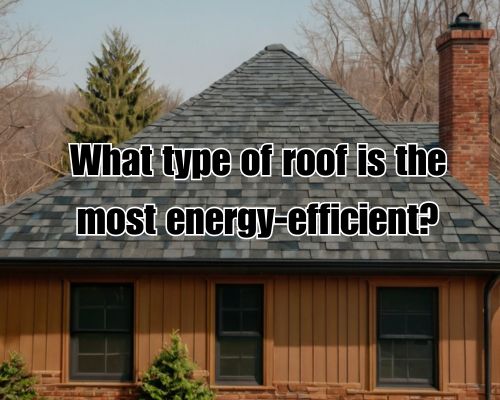What Type of Roof Is the Most Energy-Efficient? A New Jersey Homeowner’s Guide
In the ever-evolving world of home improvement, energy efficiency is no longer a luxury—it’s a necessity. Especially in a state like New Jersey, where residents experience both humid summers and icy winters, the right roofing material can significantly reduce energy bills while boosting indoor comfort. But what type of roof is the most energy-efficient?

This question is top of mind for eco-conscious homeowners, real estate investors, and even builders across North Jersey, Central NJ, and the Jersey Shore. Whether you’re upgrading your current roof in Middletown, installing a new one in Morristown, or building a coastal retreat in Cape May, with CJ Commercial Roofing NJ, we’ll unpack your best options for energy-efficient roofing, backed by local insights and cost-related considerations.
Why Energy-Efficient Roofing Matters in New Jersey
Let’s start with the basics. New Jersey’s climate is considered humid subtropical in the south and humid continental in the north. That means sweltering summers and freezing winters—each season putting unique stress on your home’s thermal envelope.
An energy-efficient roof can:
- Reduce heating and cooling bills by 10–30%
- Increase indoor comfort year-round
- Decrease environmental impact
- Boost property resale value (especially in eco-conscious suburbs like Princeton or Montclair)
- Potentially qualify for New Jersey Clean Energy Program incentives
It’s more than a cosmetic upgrade—it’s a functional, financial, and sustainable investment.
Most Energy-Efficient Roofing Options for New Jersey Homes
When evaluating what type of roof is the most energy-efficient, several materials stand out. However, efficiency depends not just on the material itself but on color, coating, ventilation, and installation quality. Let’s break down your top contenders:
1. Metal Roofing
LSI Keywords: Cool roofs, reflective roofing, metal panels, standing seam roof
Metal roofs—particularly standing seam metal roofing—are among the most energy-efficient options available. They reflect solar radiant heat rather than absorbing it, which is ideal for hot summers in Southern NJ cities like Cherry Hill or Atlantic City.
Pros:
- High solar reflectance and thermal emittance
- Lifespan of 40–70 years
- Recyclable material
- Works with solar panel installations (popular in towns like Edison and Bridgewater)
Cons:
- Higher upfront cost ($10–$16 per square foot installed)
- Can be noisy without proper insulation
💡 Pro Tip: Opt for a “cool roof” metal coating that meets Energy Star guidelines.
2. Clay and Concrete Tiles
While not common in northern climates, clay and concrete tile roofs are surprisingly efficient. They offer natural insulation by allowing air circulation under the tiles, which is useful for homes in coastal areas like Asbury Park or Ocean City where salt air and sun exposure are factors.
Pros:
- Excellent heat deflection
- Long lifespan (50+ years)
- Fire-resistant
Cons:
- Heavier, requiring structural reinforcement
- Installation costs between $12–$20 per square foot
If you’re aiming for a Mediterranean or Spanish-style aesthetic and want to maximise efficiency, this is a stylish and sustainable choice.
3. Asphalt Shingles (Cool Roof Variants)
The standard in New Jersey roofing, asphalt shingles get a bad rap in energy efficiency. But modern “cool roof” asphalt shingles are coated with specially designed granules to reflect more sunlight and absorb less heat.
Pros:
- Budget-friendly ($5–$8 per square foot)
- Easy to source and install
- Lighter colors reflect more sunlight
- Compatible with NJ local zoning codes
Cons:
- Shorter lifespan (15–30 years)
- Less effective than metal or tile in extreme heat
For a balance between affordability and performance, Energy Star-rated asphalt shingles are a solid middle-ground for areas like Hackensack, New Brunswick, or Toms River.
4. Green or Living Roofs
Yes, even in New Jersey, green roofs are making their way into urban and suburban environments. This system features a waterproof membrane topped with vegetation, creating insulation through soil and plant mass.
Ideal for: Eco-conscious homeowners in cities like Newark, Jersey City, or Hoboken.
Pros:
- Excellent natural insulation
- Reduces urban heat island effect
- Qualifies for some green incentives in NJ
Cons:
- Requires specific structural conditions
- High installation and maintenance costs ($15–$25 per square foot)
Green roofs are ideal for flat or low-slope roofs and pair well with solar energy systems, making them doubly sustainable.
5. Synthetic or Composite Roofing
Made from a blend of recycled plastics, rubber, and polymer, synthetic roofing materials mimic the look of slate, tile, or wood while offering high durability and thermal resistance.
Pros:
- Lightweight and durable
- Reflective coatings available
- Less expensive than natural slate
- Long lifespan (40–50 years)
Cons:
- Not all options are certified as “cool roofs”
- Limited data on long-term performance
Popular in upscale suburbs like Bernardsville or Short Hills, synthetic shingles give the look of luxury without the energy drain. Se CJ Commercial Roofing NJ for more.
Important Considerations for New Jersey Homeowners
When selecting the most energy-efficient roof, don’t just look at material. Factor in:
- Roof Pitch: Steeper roofs may shed snow better but absorb more solar heat if south-facing.
- Color: Lighter colors reflect sunlight; darker ones absorb heat.
- Insulation: Pair your roofing choice with proper attic insulation for maximum savings.
- Ventilation: Ridge vents, soffit vents, and proper airflow prevent overheating and condensation.
- Local Climate: Shore towns have different roofing stressors (salt, wind) than inland suburbs (ice dams, snow loads).
Additionally, always ensure your roofing contractor is licensed in New Jersey, understands local building codes, and can help you navigate rebates or energy-efficiency grants.
Cost vs. Long-Term Savings
Here’s a rough comparison table for New Jersey homeowners:
| Roofing Type | Avg. Cost/Sq Ft Installed | Lifespan (Years) | Energy Efficiency Rating | ROI Potential |
|---|---|---|---|---|
| Metal | $10–$16 | 40–70 | ★★★★★ | High |
| Clay/Concrete Tile | $12–$20 | 50+ | ★★★★☆ | Moderate |
| Cool Asphalt Shingles | $5–$8 | 20–30 | ★★★☆☆ | Moderate |
| Green Roof | $15–$25 | 30–40 | ★★★★★ | High (Long-Term) |
| Synthetic Roofing | $8–$14 | 40–50 | ★★★★☆ | High |
Energy-Efficient Roofing and Home Resale Value
Homes with energy-efficient roofing tend to sell faster and at higher prices, particularly in sustainability-savvy areas like Princeton, Montclair, and Summit, NJ. Buyers are more conscious of long-term utility savings, environmental impact, and futureproof construction—qualities that energy-efficient roofing brings to the table.
Final Thoughts: What’s Right for You?
So, what type of roof is the most energy-efficient? In New Jersey, metal roofing often leads the pack, especially when combined with radiant barriers, insulation, and solar panels. However, the “most efficient” solution depends on your budget, home style, location, and long-term goals.
Whether you’re upgrading in Passaic County, building in Hunterdon, or investing in a rental near the Jersey Shore, make your choice strategically—and work with a certified roofer who understands local conditions and codes.
💬 Need help choosing the right roof for your New Jersey home? Consult with local energy-efficiency experts or request an inspection to see which material is right for your budget and property goals.


